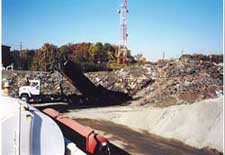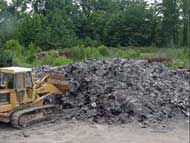| Iowa
A construction and demolition debris recycler in Iowa has sampled loads of shingles since 1999. The shingles are sampled by taking random grab samples from a load and having a laboratory analyze for asbestos using polarized light microscopy (PLM). Out of a total of 1791 samples tested, none was found to have detectable levels of asbestos.
Maine
An asphalt shingle recycler in Maine (see case study) tested 118 samples. Representative composite samples were collected on a per-incoming-load basis and analyzed using PLM. None of the samples was found to contain asbestos.
Massachusetts
An asphalt shingle recycler in Massachusetts tested incoming asphalt shingles on a per-load basis. A total of 2,288 composite, representative samples were taken from the incoming product. Samples were analyzed using PLM. Twelve samples contained asbestos, but 11 contained less than 1% [NESHAP defines ACM as any material containing more than 1% asbestos]. The twelfth sample had 2% asbesto. These results, as defined by NESHAP, show only 1 in 2, 288 samples had sufficient asbestos to categorize it as ACM. Samples were also collected from the tarpaper and the outgoing finished product and analyzed using PLM. Out of 69 tarpaper samples, two contained over 5% asbestos and two contained less than 1% asbestos. Out of 109 finished, outgoing product samples, two contained less than 1% asbestos. (see "Asbestos analysis of Post-Consumer Asphalt Shingle Waste")
Missouri
Testing results were provided by the Missouri Division of Environmental Quality. During an asbestos survey, six shingle samples were collected and analyzed with PLM. No asbestos was detected.
Florida
Shingle testing was completed as a part of the "Roof to Roads" project. Two hundred and eighty-seven samples were taken of incoming shingles: 2 tested above 1% for asbestos. Seventeen samples were also taken during the shingle grinding process. None of the samples had asbestos over 1%.
|

